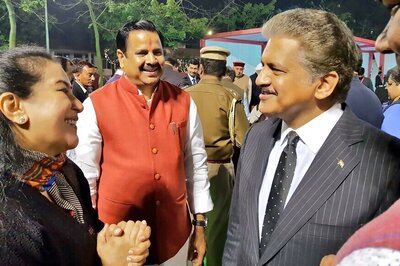
views
New Delhi: India is on the move like never before. The reform process started with the liberalisation of the economy in the 1991 is bearing fruit today. And the most significant consequence has been the emergence of a new face of entrepreneurship. At CNN-IBN, we call this the birth of a Young India.
Sixteen days before the Union Finance Minister rise to present the Union Budget 2007, things have never looked better. The economy is growing in about 9 per cent, the industry is scorching at a growth rate of about 11 per cent, and in the second week of February, corporate India has sealed up deals in excess of $25 billion.
In that context, CNN-IBN's Shirin Bhan spoke to a large group of representatives from the Corporate India's GenNext on CNN-IBN’s Special Show Rising India: Corporate India's Generation Next to find out where they see the economic blueprint of India in the next the couple of years. It was the largest congregation of corporate leaders in Indian television history.
Is it actually easier to do business now in terms of approvals and permits? Do the Indian entrepreneur actually thinks that the environment has actually changed and is enabling enough for an entrepreneur with Rs 10,000 or Rs 20,000 to actually get down there and start a business?
As far as the poll is concerned, it was an even verdict with 48 per cent saying 'yes' and an equal number saying 'no'. The rest 4 per cent voted "can't say".
Ashish Gupta of Evalueserve says "one can't apply the same parameters for every industry. It's easier for the new economy. It might be very different in the services sector, where the availability of venture capital is now far more. Overall, it's more of an even situation (between good and bad). But at least from the point of view of our industry and our business, I can say that it's far more easier to do things now," he says.
Gupta, however, says things have definitely become easier now. "But it's not an easy situation when you compare with other economies. If you look at things like FDI automatic route today, we still don't have a situation where you can go in for investment in the right sector, money flows in and not much has to be answered back to the government. "
Rahul Munjal, CEO of Easy Bill, however, says he has not run into any trouble so far. "And when I speak to parents or my grandparents and when they tell me about the environment back then, I think it's definitely easier. But I don't know if it is easy enough."
Shivinder M Singh of Fortis Healthcare says it's very sector-specific.
"In the healthcare space, it's clearly not favourable. A lot of areas where infrastructure is required, you have to keep on going back to the government for regulation. Take for instance, shopping mall or offices. You still need a whole range of environmental clearances from the Central government. It's a pain area. It has derailed a lot of projects which should have been up by today, but they have not even started. There are still some areas where you need to keep interfacing with the government and it's a big issue. If you have very little involvement with the government, you are fine. But I don't think that's the case across the board," Shivinder argues.
Diskshu Kukreja says at a policy level, it's fine to create approvals. "Environment, for instance. On the face of it, it sounds logical to everybody. Yes, environmental issues should be looked at before any new greenfield projects come into place. But what is sad is that really the people who are examining these projects before they are deemed as approved don't have very much knowledge about the subjects themselves."
"So that's where you end up in issues where you are trying to grease plums or you do any other thing to divert the system. And then the courts, of course, step in. So the issue is that while the intention might be there, but unless that knowledge percolates to the people who are regulating those approvals, the environment continues to the very tough at the grass-roots level," Kukreja points out.
"The spirit of entrepreneurship or the fact that there are so many more first-generation entrepreneurs ready to go out and stake it, or ready to go out and give up there jobs and do something big and not mom-and-pop stores," says Deep Kalra, CEO, Makemytrip.com.
"This would have never happened if there weren't the Narayana Muthys of the world or the Suzlons of the world. There are so many compelling examples for people to get enthused about or people to get excited about and go out and do it. That obviously means that something has changed. Either they have been success stories we are ready to emulate or venture capital or stuff like that. So we have to admit that something has actually changed and that's obviously the environment," he asserts.
Sandeep Parekh, adviser (legal) with the Securities and Exchange Board of India, says: "I don't think you could imagine a person of my age heading two departments at Sebi. Things are changing, but there needs to be more participation of the young, there needs to be more change in out thinking and there needs to be education. For instance, the IIMs and IITs are practically decaying because people who passed out of these institutions are not supporting them in terms of both wealth and faculty."
Is the bureaucracy less corrupt now?
Veneet Bajpai, CEO of Magnon Solutions, answers in the negative. "We as a web solution company have worked a lot with the government. In fact, we did the India Shining campaign on the Internet for the Government of India at that time. We have done a lot of work with the Ministry of Finance. We have dealt with several bureaucrats in the last couple of years and we just found them to be excellent professionals. We got excellent support from them," he proffers.
Ratul Puri of Moser Baer too says "we are overly negative with the bureaucracy."
"I have also had extremely good experience when we have dealt with the bureaucracy. We have had challenges which we faced outside India, within India. We have appealed to the bureaucracy and they have been extremely positive in their response. "
Praveen Tyagi, Director of Quest Tutorials, however, begs to differ. "Coming from the education sector, I really can't see how I can open a school in India. Most of it is due to bureaucratic hassles. It's mainly due to the babudom, which is there. Till the time it's there, I don't see higher education getting better."
Sandeep G Manudhane, CMD of PT Education, however looks at it differently. "I am also from the field of education. I would like to rephrase this question as: 'do you think we Indians are more law-aiding now?' And the answer to that very clearly is no."
Shivinder M Singh of Fortis Healthcare doesn't agree. "It has nothing to do with being corrupt. Jumping a red-light if not law-abiding, driving on the wrong side of the road is not law-abiding. But it's not corrupt. Corruption is when you give Rs 100 to the traffic cop so that he lets you out."
"I don't think Indians are law-abiding," he admits. "I think that's why they have an entrepreneurial spirit. You go to Singapore, they are very law-abiding citizens. But they are not entrepreneurial. They are setting up schools to create entrepreneurship. You can't teach entrepreneurship to an Indian. You teach him entrepreneurship, you lose his entrepreneurial spirit," he says.
Vivek Agarwal, CEO of Liqvid, says: "When you spend your time managing the system, you have very less time for business. I don't think entrepreneurship is a result of over-regulation. It just gets constrained by it. Big and successful people are able to manage regulation, the small guys can't manage it. We have to think in terms of equality of opportunities instead of equality of outcome."



















Comments
0 comment